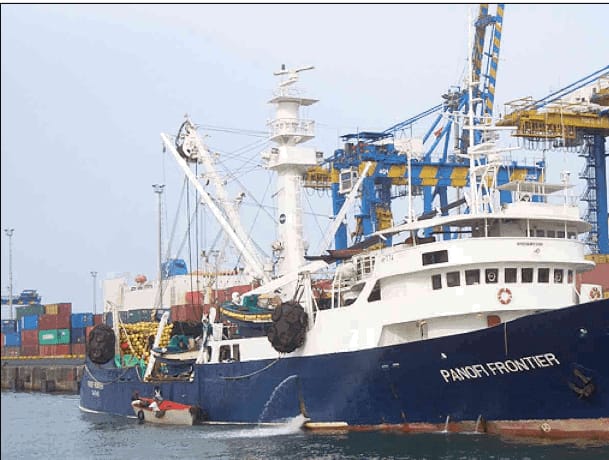The Ghana Tuna Association (GTA) has stated that it will from this month put Naval officers on-board tuna vessels as part of measures to fight the frequent piracy attacks on the high seas.
Mr. Richster Nii Amarh Amarfio, Secretary of the Association said in an interview that, the move has become necessary as some parts of the Ghanaian waters especially the Eastern Corridor has been found by the Korea government as a highly risky area with piracy activities.
He disclosed that, two Ghanaian vessels had been hijacked by pirates this year in which five Korean crew members were taken captive and released after a ransom was paid. Some of these foreign Nationals, according to him had returned to their countries out of fear.
The Secretary further revealed that Ghana do not have trained seamen and therefore partners the Koreans who have trained captains whose exit might collapse the tuna industry.
He said vessel owners will have to take care of officers onboard.
A recent report published by the Environmental Justice Foundation (EJF) revealed that, Ghana’s fish populations are in steep decline. It said, severe overcapacity of the trawl fleet combined with the illegal practice of ‘saiko’ – where industrial trawlers illegally target the staple catch of small-scale fishers and transfer it to specially adapted boats at sea – is driving the collapse of Ghana’s inshore fishery. This puts the food security and income of millions of Ghanaians into jeopardy.
The new report also shows that basic human rights of Ghana’s fishing communities, including the right to adequate food, an adequate standard of living and just working conditions, are under threat.
Over half the 215 small-scale fishers, processors and traders EJF spoke to, reported going without sufficient food over the past year. This was especially severe among the processors and traders, the vast majority of whom are women.
Over 70% of respondents also reported a deterioration in their living conditions over the past five years, with incomes falling below the level necessary for a decent living, leaving them unable to cover basic needs.
Local fishers are increasingly having to compete with industrial vessels to survive, travelling further and further out to sea in search of catches. This puts both the fishers, and the fishing equipment on which they depend, at risk. Around 70% of the fishers surveyed had suffered damage to their fishing gear by industrial trawlers.
The report stops short of stating that mismanagement of the fisheries sector by the government has causes violation of fundamental human rights but calls for urgent investigation into this matter.
In failing to prevent trawling companies from violating the right to work of small-scale fishers and workers it is unclear whether Ghana is meeting its minimum obligation under international law to protect the human rights that would enable this marginalised group to live a life of dignity.
Other essential human rights, such as access to clean drinking water, education, sanitation, medical services, and social security are also under threat, the report found.
Richster Amarfio, secretary of the Ghana Tuna Association, however said he does not agree with many points in the EJF report.
“I have always challenged the dignity of EJF because it’s skewed,” Amarfio said in the interview. “It doesn’t follow any proper research. There are 72 registered trawl vessels in Ghana and none are foreign-owned. They are owned by Ghanaians.”
Amarfio also questioned the allegations of human rights abuses on these industrial trawlers, saying the EJF report only presents one side of the story. “Did they interview the company, the owners? He quizzed
EJF told Mongabay that the organization did not speak to the officers or companies due to the “opacity of the sector.”
Amarfio said many of the issues may arise when observers challenge the authority of the captains.






